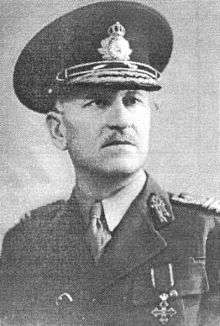Constantin Constantinescu-Claps
Constantin Constantinescu-Claps (February 20, 1884 – 1961) was a Romanian military commander during the Second Balkan War, World War I and World War II, condemned as a military criminal in the Communist Romania at the end of World War II.
Constantin Constantinescu-Claps | |
|---|---|
 General Constantin Constantinescu-Claps | |
| Born | 20 February 1884 Beceni, Bacău County |
| Died | June 1961 |
| Allegiance | |
| Service/ | Romanian Land Forces |
| Years of service | 1913–1944 |
| Rank | Army General (1st class) |
| Commands held | 4th Army |
| Battles/wars | Second Balkan War World War I World War II |
Biography
From 1903 to 1905 he graduated from the Military School of Artillery and Genius, and he traveled all the steps of his military career, from the rank of second lieutenant, to the general army corps. During the Second Balkan War and World War I he served as a captain in the 12th Artillery Regiment, eventually being promoted to major in 1917. During the interwar period he rose through the ranks in the Romanian Army.
On February 1, 1940, he was appointed the commander of X Corps and coordinated their retreat during the Soviet occupation of Bessarabia and Northern Bukovina. From July 18 1941, during Operation Barbarossa, he commanded the XI Corps and took part in Operation Munchen and the Siege of Odessa (1941).
On November 9, 1941, he was appointed the commander of the Romanian Fourth Army and fought in the Battle of Stalingrad. On February 10, 1943, he was relieved of his assignment and replaced by Constantin Sănătescu.
Constantinescu-Claps retired in 1943, was arrested in 1951, and was condemned to 15 years' imprisonment in 1954. In 1955, he was released.
In the early stages of Operation Barbarossa General Nicolae Ciuperca noted: "General Constantinescu has led the army corps with a lot of competence, causing, indirectly, the withdrawal of the Soviet forces between the Dnister River and the Suhoz Lake. I consider him to be a very good army corps commander, who is distingushed by great devotion and precious optimism".
He received the Order of the Crown (Romania), Order of the Star of Romania and Order of Michael the Brave. In spite of his rank and unlike many other Romanian generals, he never received any German medals and was in conflict with Ion Antonescu due to his anti-fascist stance.
References
- Zalessky, K.A. Kto byl kto vo vtoroy mirovoy voyne. Soyuzniki Germanii. Moscow, 2003